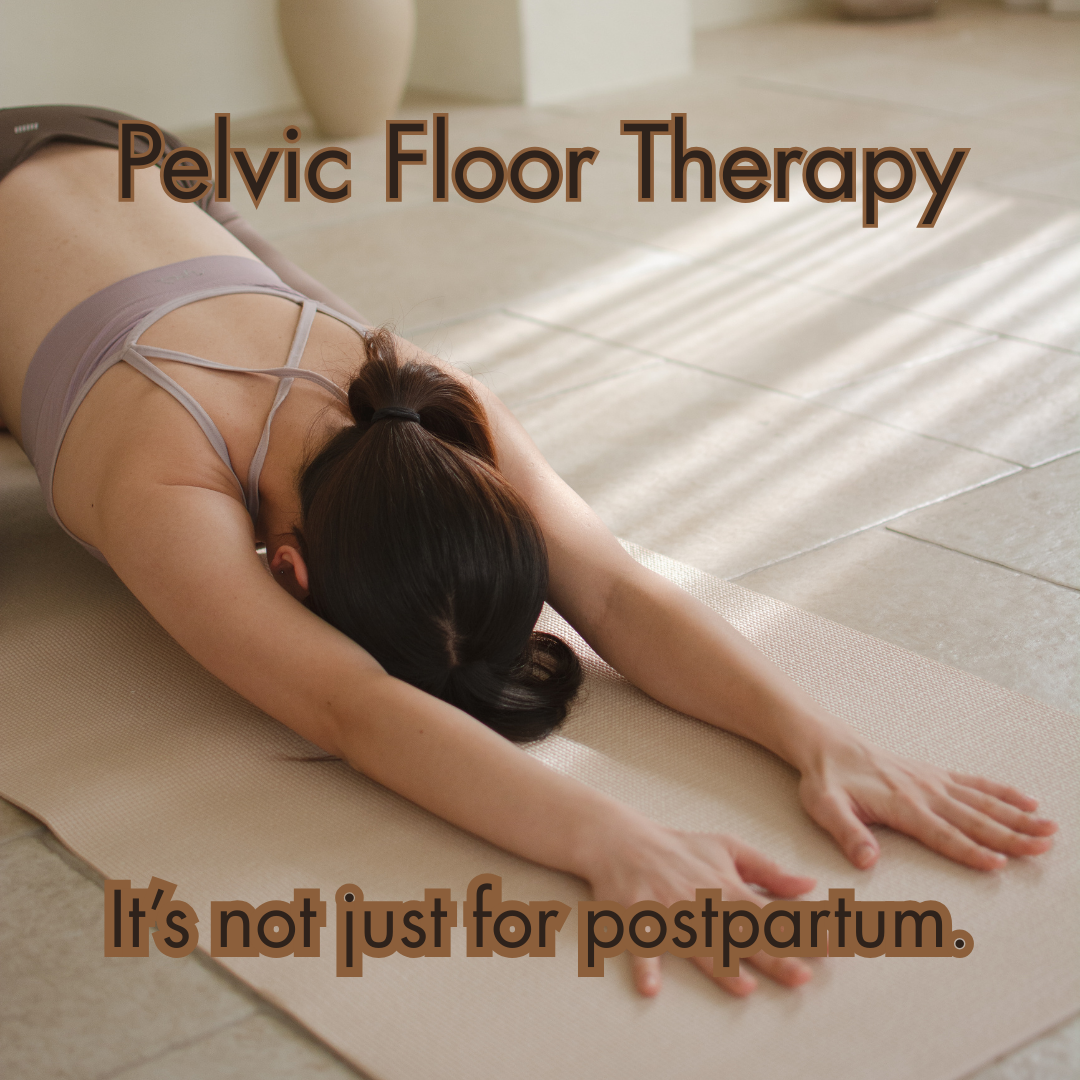Pelvic Health Blog

Why Pelvic Floor Therapy Isn’t Just for Postpartum Moms
Pelvic floor therapy isn’t just for postpartum moms. Learn who pelvic PT is for, what it treats, and why so many people benefit at every stage of life.

Perineal Tears and Episiotomy Recovery — What You Need to Know
Many women are told to “just give it time” after a perineal tear or episiotomy, but lingering pain, scar tightness, or pelvic floor dysfunction can make recovery difficult. At Connect PT in Orlando, we help with scar mobilization, relaxation techniques, and gentle strengthening so moms can return to intimacy, exercise, and daily life with confidence.

Tailbone Pain (Coccydynia) — Why Sitting Hurts and What Helps
Tailbone pain after childbirth, a fall, or prolonged sitting is more common than most women realize. It can make driving, working, or even relaxing on the couch uncomfortable. At Connect PT in Orlando, we address coccydynia with gentle pelvic floor release, posture adjustments, and movement strategies to relieve pressure and restore comfort.

Heavy Periods and Pelvic Floor Symptoms — The Overlooked Link
Heavy periods can do more than disrupt your month — they may worsen pelvic floor symptoms like leakage, prolapse, or pain. Hormonal fluctuations during the cycle affect connective tissues, ligaments, and even muscle strength. At Connect PT in Orlando, we help women understand cycle-related changes, modify exercise when needed, and use pelvic floor strategies to manage symptoms across the month.

Posture and Pelvic Floor — The Connection You Didn’t Know About
Did you know your posture directly affects your pelvic floor? Slouching, rib flare, or constant tension can strain pelvic muscles and lead to leaks, prolapse, or pain. Postpartum moms often develop compensations that make symptoms worse. At Connect PT in Orlando, we teach simple posture resets and breath strategies that improve alignment and reduce pressure on your core and pelvic floor.

Nighttime Urinary Leaks — Why They Happen and What Helps
Waking up in the middle of the night with bladder leaks can feel frustrating and isolating. Nighttime incontinence often happens when pelvic floor muscles and bladder signals aren’t working in sync. Pregnancy, postpartum recovery, or even hysterectomy can increase the risk. At Connect PT in Orlando, we use bladder retraining, pelvic floor strengthening, and lifestyle strategies to help women sleep through the night without worry.

Constipation and Pelvic Health — What No One Talks About
Constipation is more than just uncomfortable — it can strain your pelvic floor, contribute to prolapse, or worsen urinary leakage. Many women struggle with constipation during pregnancy, postpartum, or after pelvic surgery. At Connect Physical Therapy Pelvic Health and Wellness in Orlando, we teach gentle strategies like proper toileting posture, breathwork, and pelvic floor relaxation to protect your body and restore comfort.

Safe Return to Lifting Weights After Baby
Eager to get back to lifting after pregnancy? Whether it’s weights at the gym or picking up your toddler, your core and pelvic floor need to be ready. At Connect Physical Therapy Pelvic Health and Wellness in Orlando, we assess your strength, pressure management, and movement mechanics. With guided progression, you’ll return to lifting safely and confidently — without leaks, pain, or setbacks.

Vaginal Dryness After Birth or Menopause — What to Do About It
Vaginal dryness is a common but rarely discussed issue after childbirth, during breastfeeding, or in menopause. Hormonal changes reduce natural lubrication, leading to discomfort, painful intimacy, or even bladder irritation. At Connect PT in Orlando, we help women with education on lubrication, pelvic floor relaxation, scar care, and referrals for supportive hormonal therapies when appropriate. You don’t have to “just live with it.”

Pelvic Pain — Understanding the Causes and Solutions
Pelvic pain can feel confusing and isolating, especially when you’re told “everything looks normal.” Common causes include muscle tension, scar tissue, nerve irritation, or hormonal shifts. At Connect Physical Therapy Pelvic Health and Wellness, we take a holistic approach — combining gentle pelvic floor release, posture training, and personalized exercises to reduce pain and restore function.

Bladder Urgency and Frequency — Why It Happens and What to Do
Running to the bathroom every hour? Feeling strong urges you can’t control? These bladder issues are common postpartum, post-surgery, or even without birth — but they’re treatable. At Connect Physical Therapy Pelvic Health and Wellness, we retrain bladder habits, strengthen support muscles, and teach urge-suppression techniques so you can regain control and freedom in daily life.

Why You’re Still Exhausted Months After Birth — And What Helps
If you’re months postpartum and still feel drained, it’s not “just motherhood.” Hormonal shifts, poor sleep, and an under-recovered core and pelvic floor can all contribute to lingering fatigue. At Connect Physical Therapy Pelvic Health and Wellness, we look at the whole picture — from breathwork and posture to gentle strength-building and sleep strategies — to help moms restore energy and resilience.

Postpartum Prolapse — What You Need to Know
A feeling of heaviness, bulging, or pressure in your vagina after birth may be a sign of pelvic organ prolapse. It’s common, but it’s not something you should ignore. Prolapse happens when pelvic organs shift due to weakened support structures during pregnancy and delivery. At Connect Physical Therapy Pelvic Health and Wellness in Orlando, we guide women through safe exercises, posture strategies, and pelvic floor rehab to reduce symptoms and restore confidence.

Painful Sex After Birth or Surgery — You’re Not Alone
Pain with intimacy after childbirth, C-section, or pelvic surgery is more common than most women realize — but it’s not something you should have to “just live with.” Causes often include pelvic floor tightness, scar tissue restrictions, or hormonal changes, especially during breastfeeding or post-menopause.
Ignoring painful sex can affect relationships, confidence, and emotional wellbeing. The good news? Treatment is available. At Connect Physical Therapy Pelvic Health & Wellness in Orlando, we use gentle pelvic floor relaxation techniques, scar mobilization, dilator training, and education on lubrication and positioning.
You are not alone. This is a medical condition, not a reflection of you — and with the right care, most women experience lasting improvement in comfort and confidence.

When Can I Exercise Again After Baby? A Pelvic PT’s Guide
Being “cleared at 6 weeks” doesn’t always mean your body is truly ready for running, HIIT, or lifting. Signs like leaking, core doming, heaviness, or pain signal that your core and pelvic floor may need more recovery first.
At Connect Physical Therapy Pelvic Health & Wellness in Orlando, we guide new moms through safe first steps — walking, breath + core connection, and gentle strengthening. With personalized screenings for pelvic floor strength, impact tolerance, and functional movement, we help you rebuild confidence and return to the workouts you love, safely and sustainably.

Life After Hysterectomy — Why Pelvic Floor Therapy Matters
A hysterectomy can bring relief from pain or heavy bleeding, but recovery often comes with new challenges — from core weakness and scar tightness to bladder changes or painful intimacy. The good news? You don’t have to navigate this alone.
At Connect Physical Therapy Pelvic & Wellness in Orlando, we help women rebuild strength and confidence after hysterectomy. Through scar care, gentle pelvic floor retraining, bladder and bowel strategies, and guidance for safe return to activity, we support your healing every step of the way. Most women benefit from starting therapy around 4–6 weeks post-op, once cleared by their surgeon.

C-Section Recovery — 5 Things No One Tells You
A C-section is one of the most common surgeries worldwide, yet the recovery guidance many moms receive is limited to “don’t lift for 6 weeks.” The truth? Healing well requires more than just rest.
Scar sensitivity is normal. Numbness, tingling, or pulling near your incision is common, and gentle scar massage can restore comfort and mobility.
Core weakness is expected. Your abdominal and pelvic floor muscles need guided rehab to work together again.
Posture makes a difference. Slouching or tensing around your scar can lead to back or neck pain — simple posture resets help.
Cleared doesn’t always mean ready. A 6-week check doesn’t guarantee you’re prepared for running, lifting, or HIIT — that’s where a PT screen comes in.
Emotional healing matters too. Processing birth trauma or disappointment is a key part of recovery.
At Connect Physical Therapy Pelvic Health & Wellness in Orlando, we help moms navigate every step of C-section recovery — from scar care to core strength to safe return-to-fitness plans.

How to Tell If You Have Diastasis Recti — and What to Do About It
If your belly feels weak, “pooches out,” or domes when you sit up after pregnancy, you may have diastasis recti (abdominal separation). It’s common, but with the right approach, it’s very treatable.
Diastasis recti happens when the connective tissue between your “six-pack” muscles stretches during pregnancy, leaving a gap. You can check yourself at home: lie on your back, place fingers above your belly button, lift your head, and feel for a gap wider than two fingers.
Left untreated, diastasis can contribute to core weakness, back pain, or pelvic floor issues. The good news? With breath training, posture awareness, and safe strengthening, you can rebuild your core.
At Connect Physical Therapy Pelvic Health & Wellness, we guide moms through personalized, progressive recovery programs — so you feel strong, supported, and ready to move with confidence.

Is Leaking Urine After Pregnancy Normal? What You Need to Know
Leaking urine after pregnancy is common — but it’s not normal, and it’s treatable. Pregnancy and birth can weaken or unbalance your pelvic floor, leading to leaks with coughing, sneezing, or exercise. With pelvic floor physical therapy, you can restore control, feel confident, and get back to the activities you love.
